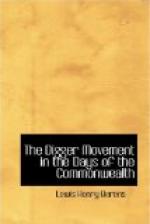“I have now obeyed the command of the Spirit that bid me declare all this abroad. I have declared it and I will declare it by word of mouth, I have now declared it with my pen. And when the Lord doth show unto me the place and manner, how He will have us that are called common people manure and work upon the common lands, I will then go forth and declare it by my action, to eat my bread by the sweat of my brow, without either giving or taking hire, looking upon the land as freely mine as another’s. I have now peace in the Spirit, and I have an inward persuasion that the spirit of the poor shall be drawn forth ere long to act materially this Law of Righteousness.”
Winstanley then proceeds to formulate the practical proposals, whereby he deemed the disinherited many might reclaim their inheritance, and that without infringing on the established rights or the property of the rich: proposals, be it remembered, which, if acted on, would have altered the whole future economic history of Great Britain. Before judging of their efficacy, we should bear in mind that at the time he was writing, before the era of Enclosure Acts, over a third of England was still common land. However, whatever opinion may be held on this point, there can be no denying the lucidity and incisiveness of his words: he says:
“But be it so that some will say, This is my land, and call such and such a parcel of land his own interest.... Therefore, if the rich still hold fast to this propriety of Mine and Thine, let them labor their own lands with their own hands. And let the common people, that say the earth is ours, not mine, let them labor together, and eat bread together upon the commons, mountains, and hills.”
Such, then, was the proposal by which Winstanley deemed the relative merits of Individualism and Communism, as a system of social union, might best be tested, and which he immediately proceeded to defend in the following words:
“For as the enclosures are called such a man’s land, and such a man’s land, so the Commons and Heath are called the common people’s. And let the world see who labor the Earth in righteousness, and those to whom the Lord gives the blessing, let them be the people that shall inherit the Earth. Whether they that hold a civil propriety, saying, This is mine, which is selfish, devilish, and destructive to the Creation; or those that hold a common right, saying, The Earth is ours, which lifts up the Creation from bondage.”
Further, he contends that if his proposals were acted on—




